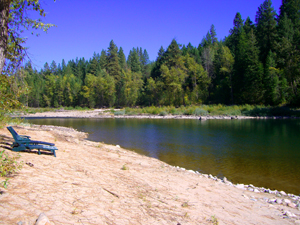Petition pressures province to address Kettle River watershed
When the Kettle River was declared a heritage river by the provincial government in the 1990’s in recognition of its outstanding natural cultural and recreational values, it came with the promise and expectation that the Kettle would see an extra level of protection of those values. Today, the river regularly faces drought conditions, the potential extinction of rare fish species, encroachment from corporate power projects, and increased demands on water use. The Boundary Environmental Alliance (BEA) is determined to see that the looming crisis on this river is addressed.
Two petitions totaling over 1400 signatures against an application by Big White Ski Resort to take more water from the Kettle, were recently submitted to the Ministry of the Environment and the Premier by the BEA. These signatures, along with several hundred more, submitted in the legislature last year by MLA Katrine Conroy, call on the government to deny Big White’s application.
In an open letter submitted with the petitions, BEA called for the government to deny the Big White application and any other applications for Kettle River water until needed hydrogeological studies and a comprehensive watershed management plan (WMP) for the Kettle are in place.
According to BEA, despite years of progressively lower flows in the Kettle, the Ministry of Environment (MOE) has minimized and dismissed all concerns about further withdrawals from the Kettle on the frequently claimed basis that the proposed withdrawals represent an insignificant difference to Kettle flows when measured at Midway during freshet, and that proposed water use by Big White will return to groundwater.
“The first claim is a classic red-herring,” says BEA member Al Grant. “If the proposed withdrawals out of the three tributary streams amounted to 100 per cent it would still show as insignificant at Midway, but those streams would be badly damaged along with the loss of groundwater recharge. The withdrawals in fact would be something less than 100 per cent but the MOE’s claim of a nine per cent draw is based on flow data from only one of the three streams using flow records from a station that operated for only 11 years, 28 years ago. Since then declining snowpack and a number of other licences issued to Big White have diminished available flows.”
The Regional District of Kootenay Boundary (RDKB) and communities along the river such as Grand Forks and Midway all wrote letters to the MOE expressing their concerns over the Big White application. While a decision on the application has not yet been made, John MacLean, chief administrative officer for the RDKB, indicated at a recent public meeting in Christina Lake that indications are that the application will be approved.
Meanwhile, the RDKB has set up a water committee to oversee the work of creating a water management plan for the Kettle. It includes citizen representatives from across the region, the Christina Lake Stewardship Society that is regarded across the province as a leader in management programs, and local government representatives along with support from staff. Chair Grace McGregor said that 10 years ago, when a group came together to fight the proposed power project at the Cascade Falls on the Kettle, she had hoped the group would keep working towards an overall management plan for the river. That didn’t happen, but now, faced with the continuing challenges on the river, the RDKB is taking a stand.
“This is a huge concern to us because we can walk across the river right now and have been able to for a long time this year. We need to make sure that that river is there for the environmental issues, for habitat issues, for tourism, for recreation, for our watershed. That river is very important to the Boundary,” said MacLean. “We’ve been working for two years to try to get the province of B.C. to partner up with us to do a study on it to look at things like climate change, drought management, on flood management and communications – all of the issues that we need to address on the Kettle River.”
MacLean also advised that the province is considering new legislation for river management planning and that the local MLA, John Slater, is heading up the province’s arm responsible for water management. MacLean said the RDKB is taking advantage of this proposed change in legislation that will allow communities to do watershed management plans with changes to the water act. “Its just proposed legislation, but we want to be there and ready to say to John, when you have this legislation in place, the Kettle River is first,” said MacLean.
Area E Director Bill Baird agrees that the WMP needs to move forward. “I read some of the petitions (that the BEA did), I would have signed the same thing. Nobody wants our rivers to dry up,” said Baird. “You know that I’ve been working on this for years and we are finally moving ahead. What can I say? The study will be done. My family lives here too, and we want to stay.”
Grant said that the Premier’s office has acknowledged their petition but that the MOE has not yet. While Grant supports the development of a management plan, he said the process will delay any action for up to six years or more.
“If the process does not begin until studies are completed, three or who knows how many years away, the whole process could take 10 years or more. Politicians and bureaucrats might like these extended timelines as it enables them to do nothing to address very current issues while pointing to the promise of some future process that might,” said Grant.
“It is useful to consider that 125 years ago the CPR was built across Canada in less than half that time. A WMP process does not need to scale mountain passes, dig tunnels, build tracks and bridges. A WMP process is mostly talk. It should begin.”






















